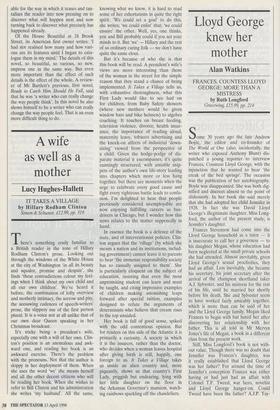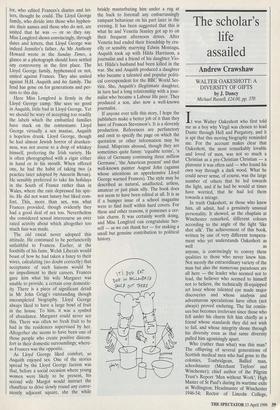Lloyd George knew her mother
Alan Watkins
FRANCES, COUNTESS LLOYD GEORGE: MORE THAN A MISTRESS by Ruth Longford Gracewin& £15.99, pp. 214 Some 30 years ago the late Andrew Boyle, the editor and co-founder of The World at One (also, incidentally, the writer who exposed Anthony Blunt) dis- patched a young reporter to interview Frances, Countess Lloyd George, with the injunction that he wanted to hear 'the creak of the bed springs'. The occasion was the publication of her autobiography. Boyle was disappointed. She was both dig- nified and discreet almost to the point of dishonesty. In her book she said merely that she had adopted her child Jennifer in 1928. In fact she was David Lloyd George's illegitimate daughter. Miss Long- ford, the author of the present study, is Jennifer's daughter.
Frances Stevenson had come into the Lloyd George household as a tutor — it is inaccurate to call her a governess — to his daughter Megan, whose education had been neglected at the small private schools she had attended. Almost inevitably, given Lloyd George's sexual proclivities, they had an affair. Less inevitably, she became his secretary, his joint secretary after the arrival of the champion shorthand taker A.J. Sylvester, and his mistress for the rest of his life, until he married her shortly before his death. She and Sylvester seem to have worked fairly amicably together, which is more than can be said of her and the Lloyd George family. Megan liked Frances to begin with but hated her after discovering her relationship with her father. This is all told in Mr Mervyn Jones's life of Megan, a book in a different class from the present work.
Still, Miss Longford's book is not with- out value. Though there was no doubt that Jennifer was Frances's daughter, was it really established that Lloyd George was her father? For around the time of Jennifer's conception Frances was either having or had just had an affair with Colonel T.F. Tweed, war hero, novelist and Lloyd George hanger-on. Could Tweed have been the father? A.J.P. Tay- lor, who edited Frances's diaries and let- ters, thought he could. The Lloyd George family, who divide into those who hyphen- ate their names and those who do not, are united that he was — or so they say. Miss Longford shows convincingly, through dates and letters, that Lloyd George was indeed Jennifer's father. As Mr Anthony Howard wrote in the Sunday Times, a glance at a photograph should have settled any controversy in the first place. The Lloyd George family, hyphenated or not, united against Frances. They also united against H.H. Asquith and his family. The feud has gone on for generations and per- sists to this day.
Here Miss Longford is firmly in the Lloyd George camp. She sees no good in Asquith, little bad in Lloyd George. Yet we should be wary of accepting too readily the labels which the embattled families have stuck on the contestants: Lloyd George virtually a sex maniac, Asquith a hopeless drunk. Lloyd George, though he had almost Jewish horror of drunken- ness, was not averse to a drop of whiskey himself, preferring the Irish variety. He is often photographed with a cigar either in hand or in his mouth. When offered one, he had the habit of taking two (a practice later adopted by Aneurin Bevan). He sensibly preferred to take his holidays in the South of France rather than in Wales, where the rain depressed his spir- its. He did not want luxury but liked com- fort. This, more than sex, was what Frances provided, though evidently they had a good deal of sex too. Nevertheless she considered sexual intercourse an over rated activity about which altogether too much fuss was made.
The old rascal never adopted this attitude. He continued to be perfunctorily unfaithful to Frances. Earlier, at the foothills of his fame, Welsh Liberals would boast of how he had taken a fancy to their wives, calculating (no doubt correctly) that acceptance of such liaisons would be no impediment to their careers. Frances gave him what his wife Margaret was unable to provide, a certain cosy domestic- ity. There is a piece of significant detail in Mr John Grigg's outstanding though uncompleted biography. Lloyd George always liked to have a large bowl of fruit in the house. To him, it was a symbol of abundance. Margaret could never see this. There was often no fresh fruit to be had in the residences supervised by her. Altogether she seems to have been one of those people who create positive discom- fort in their domestic surroundings; where- as Frances was the opposite.
As Lloyd George liked comfort, so Asquith enjoyed sex. One of the stories spread by the Lloyd George faction was that, before a social occasion where young women were likely to be present, his second wife Margot would instruct the chauffeur to drive slowly round any conve- niently adjacent square, she the while briskly masturbating him under a rug at the back to forestall any embarrassingly rampant behaviour on his part later in the evening. It has been suggested that this is what he and Venetia Stanley got up to on their frequent afternoon drives. After Venetia had ended their friendship by cru- elly or sensibly marrying Edwin Montagu, Asquith took up with Hilda Harrisson, a journalist and a friend of his daughter Vio- let. Hilda's husband had been killed in the war. She and Asquith produced a daughter who became a talented and popular politi- cal correspondent for the BBC World Ser- vice. She, Asquith's illegitimate daughter, in turn had a long relationship with a jour- nalist who became a Labour life peer. They produced a son, also now a well-known journalist. If anyone ever tells this story, I hope the publishers make a better job of it than they have of Frances Stevenson's. It is a slovenly production. References are perfunctory and omit to specify the page on which the quotation or other information may be found. Misprints abound, though they are sometimes quite funny: 'equable terms', 'a slice of Germany continuing three million Germans', 'the American present' and that well-known painter August John (against whose attentions an apprehensive Lloyd George warned Frances). The style may be described as natural, unaffected, artless, amateur or just plain silly. The book does not seem to have been edited at all. It is as if a bumper issue of a school magazine were to find itself within hard covers. For these and other reasons, it possesses a cer- tain charm. It was certainly worth doing, and Miss Longford can congratulate her- self — as we can thank her — for making a small but genuine contribution to political history.



































































 Previous page
Previous page